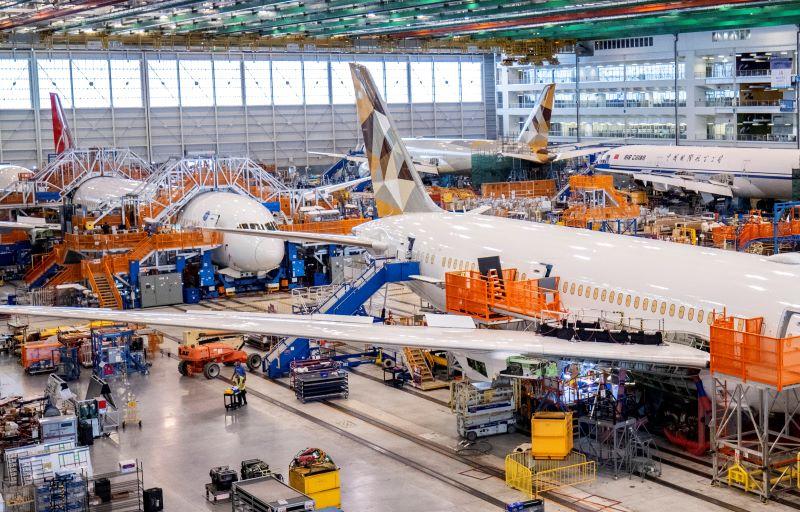
A newly discovered production issue will slow Boeing 787 deliveries near-term and require inspections and likely repairs to undelivered aircraft, the company said June 6.
The latest issue affects a fitting assembly in horizontal stabilizers built by a Boeing facility in Salt Lake City. The fittings come from an external supplier, and each unit is assembled and installed onto stabilizers in Salt Lake, a Boeing source said. Shims required in the assembly do not conform to Boeing specifications, which stipulate that routine gaps created during the mating of parts to be no more than .005 in.
It was not immediately clear if the non-conforming work is being done by a supplier or Boeing. The company declined to comment on the issue’s specifics, or any suppliers involved.
Boeing is still evaluating the scope of the issue, which was discovered within the last week. Its preliminary analysis suggests that every 787 in inventory—about 90 aircraft in all—plus any on the production line, may need repairs before they can be delivered. Some in the in-service fleet may be affected as well, but the problem is not an immediate safety-of-flight issue, so any required fixes will be done via service bulletins and a possible airworthiness directive.
The biggest immediate ramification will be a slowdown in deliveries. Repairs are expected to take about two weeks per airframe, adding to a series of production-related fixes that all inventoried 787s are undergoing before they can be delivered. Boeing said it made the decision to stop deliveries on June 2, which suggests that customer handovers may not resume until mid-June.
The work, which will be done in both North Charleston, South Carolina, and Everett, Washington, does not require removal of the horizontal stabilizer, a Boeing source confirmed. The latest issue is not related to another shimming nonconformance with the Salt Lake City-made stabilizers revealed in 2020, the source added.
“We are inspecting 787s in our inventory for a nonconforming condition related to a fitting on the horizontal stabilizer,” Boeing said in a statement. “Airplanes found to have a nonconforming condition will be reworked prior to ticket and delivery. This is not an immediate safety of flight issue, and the in-service fleet may continue to operate. We have notified the FAA and our customers and are keeping them informed of our progress.”
Production will not be affected, Boeing said. New stabilizers being delivered to Boeing’s North Charleston assembly line will conform with company specs and will not need re-work.
While near-term deliveries will slow, Boeing said it is sticking by its full-year target of 70-80 787 deliveries “at this time.”
The near-term delivery slowdown comes at a particularly inconvenient time for affected customers counting on the capacity to bolster peak-season mid-year schedules. Boeing delivered just 17 787s in the first four months of 2023. Deliveries were briefly held up in late January over a certification data issue.
